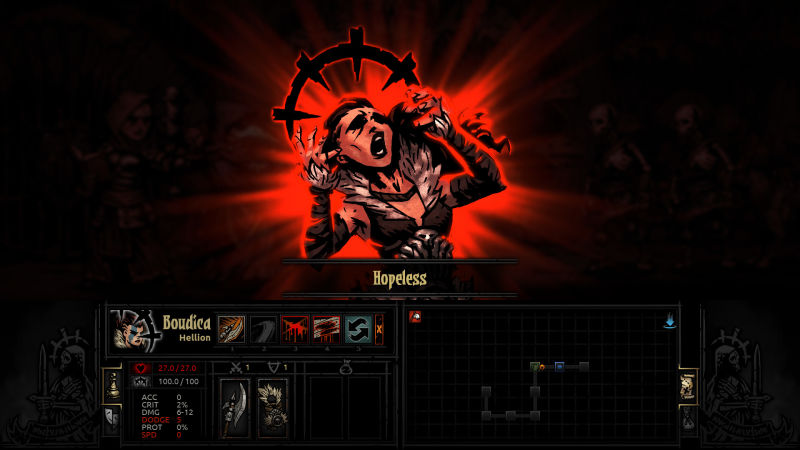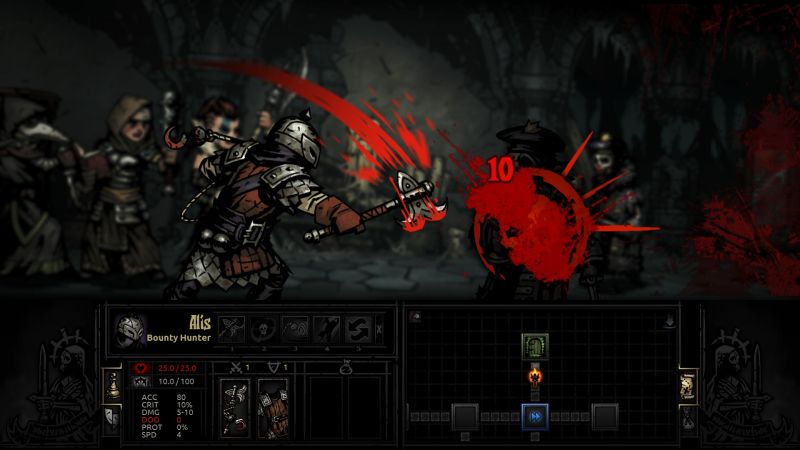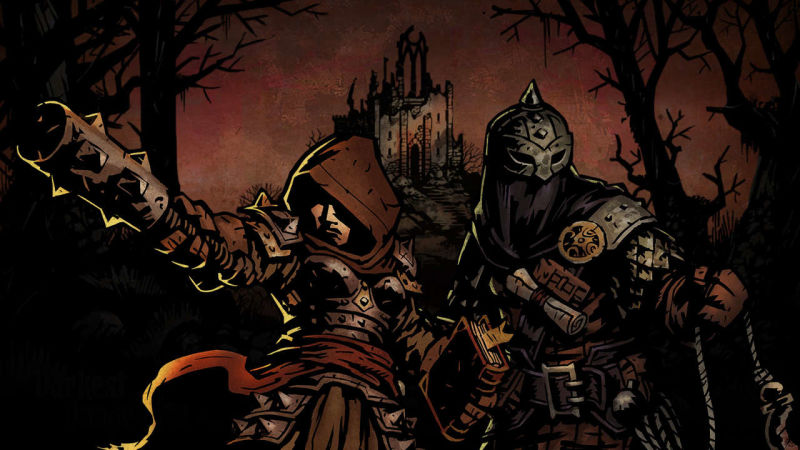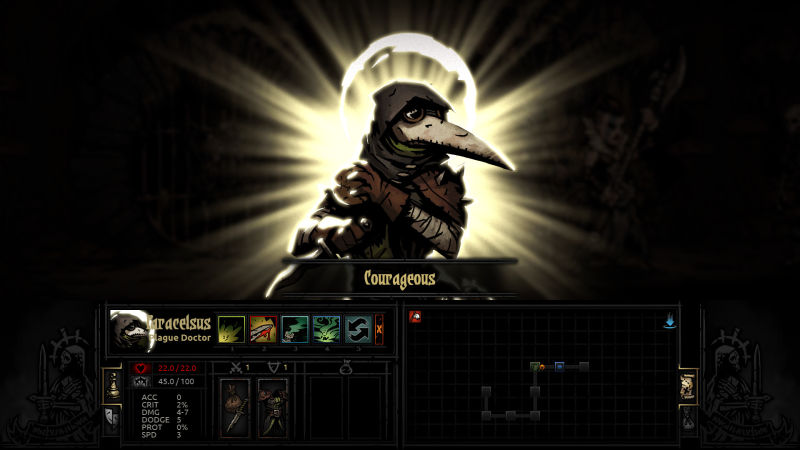The Kotaku resource talked about the difficulties Darkest Dungeon faced after it got into Steam Early Access. We share the translation of the article.
When Darkest Dungeon first appeared on Steam Early Access in February 2015, it was almost universally adored. A unique, well-designed, full of cool details game on Early Access? Give me two!
You probably think that after the release everyone lived happily ever after, right? No.
Everything went according to plan for a couple of months. A painfully complex RPG with elements of rougelike, aka a simulator of psychotrauma, soared on the wings of positive reviews from critics and masochistic fans. As our author Kirk Hamilton said at the time: “There is a feeling that the development of Darkest Dungeon has already progressed very far. There are a lot of levels, a bunch of characters, a ton of different gameplay elements, and all are interconnected and fully functional. The game is dark, intense and challenging. It will not be possible to complete it yet, but this does not make it look less complete.”
All honeymoons end one way or another. Some are not at all rosy. For Darkest Dungeon, the first bell rang when the developer Red Hook Studios added two contradictory mechanics in July 2015: “Corpses” and “Heart attack”. In the game, the whole fighting game is built around the correct location of the player on the ground (the essence is this: after death, enemies leave corpses; to attack someone for a corpse, you need to break the corpse, which takes extra time, – approx. editors), and “Corpses” added an additional level of pain to it. The “heart attack”, in turn, led to the character dying after reaching a certain level of stress. As a result, some users began to complain that too much in the game depends on chance, and not on skill.
Red Hook consistently defended their game design solutions, and therefore the reviews of some players became more and more poisonous. “I remember asking myself – does the game need this feature? And even if so, maybe we should give it up, since so many people don’t like it? Even if we believe in this feature with all our heart?”, – shares the game designer of the game Tyler Sigman (Tyler Sigman).
“Tyler and I were constantly sitting in Google Hangouts and trying to look at all possible perspectives from all sides,” adds creative director Chris Bourassa. – Every now and then they changed their minds. Engaged in self-examination. We were afraid that we had been over-praised. We were worried that if we made at least one change, then all the fans would leave. But isn’t Early Access needed to make changes?”.
In August 2015, the situation reached a boiling point. The Darkest Dungeon forums were flooded with malicious messages. Some scolded the game, others questioned the integrity of the developers. Someone was just whining and swearing. Some of the comments turned into a real verbal battle between those who were for the changes and those who were against.
In the end, Burassa, Sigman and other team members made a difficult but necessary decision. Admitting that “Corpses” and “Heart Attack” did not bring into the game the adrenaline rush that was drawn in their imagination, the developers gave players the opportunity to disable these features. It was not an ideal solution, but it was a good way to calm the crowd, which was already armed with pitchforks and torches.
As a result, the passions subsided a little, but not completely. A group of angry players continued to actively seek the attention of Red Hook, which in October 2015 forced the developers to adopt a set of strict rules about communication on forums.
“We have equally divided the responsibilities of managing social networks,” says Burassa about the launch of the game in Early Access. – And there was a madhouse just. Probably, when sales were actively going on, it was necessary to hire a community manager. In vain we decided that we would just post information about the game on the forum, and the players would judge us only by the content.”
“The game initially created such a good, solid overall impression,” Sigman shares. – And we’re like, “Maybe we won’t need much help.” It was definitely a mistake.”
By the time of its release in 2016, Darkest Dungeon had gained fame thanks to a small but active group of detractors who fiercely pursued any mention of the game and seized any opportunity to express their dissatisfaction. Some of them believed that the developers had screwed up an almost perfect game by changing key mechanics and making the project too complicated or too simple. Others accused Red Hook of censoring forums and preventing them from expressing “reasonable” and “civilized” criticism.
At some point, this group of detractors began to write to the game critic Jim Sterling (Jim Sterling), so that he would spread both the old changes in the game (the “Corpses” mentioned above), and updates that kind of made the game easier, and the team’s decision to stop the discussion. These things, in their opinion, led to the fact that “the idea of Early Access was perverted.” Sterling, known as the unofficial “nightmare” of local developers, categorically refused. He studied Darkest Dungeon for a long time and closely after the updates and eventually decided that he liked the release of the game.
According to Burassa and Stigman, by this point the question of the quality of the game had faded into the background. For detractors, this has become a personal matter. That’s why Red Hook ignored or closed, as mentioned above, some discussions. They were unproductive.
“I think there were two kinds of criticism,” Burassa shares. – Yes, there was a strong negative reaction about the game itself and about the tangible, noticeable changes that took place in the game. But at a certain point – especially last summer – it became difficult when, instead of reviews about the game itself, they began to discuss our motivation, our decency and our professionalism very intensively. That was unpleasant.”
“We are all human beings,” says Sigman. – And even before this whole bullshit started, they joked that it was like we were in the Darkest Dungeon ourselves. One of the most difficult moments was that we tried to read all the reviews anyway. Even if some rude or crazy comments were left to us, we still read them in order to extract useful information for ourselves. Some boorishly voice an opinion, but in their reviews you can still find something valuable for yourself. But some just lose the adekvat. And it’s not about the game anymore.”
This, according to Burassa, was a “wrecking campaign”. And although such people desperately wanted to try to convince, all efforts were in vain. The situation can be explained by the fact that Red Hook had previously tried very hard to please everyone at once – both those who wanted trash and those who were looking for something less brutal. In the end, the developer still had to choose one line and follow it.
At first glance, the story turns out to be strange. Red Hook released a good game, but faced with such a flow of bile that even the harshest boss of Darkest Dungeon never dreamed of. Yes, the project was not perfect, but the developers tried to give the player a choice in cases where it did not go against their vision of the game. But this is what happens when you encroach on a shrine, even if you make it very clear that what you are doing has nothing to do with the shrine.
“Probably, the players were waiting for Darkest Dungeon to be perfect,” Burassa suggests. – And we did not go the way they wanted, and did not embody some moments exactly as they thought it was necessary. Apparently, this is where the discontent arose.”
The whole situation, however, is quite in the spirit of Early Access. This system tends to attach a symbolic meaning to the player’s opinion. But the thing is that it’s easy to confuse opinion with unquestionable authority and complete control, and then go berserk when control is lost. Early Access gave developers unique opportunities in terms of revenue and feedback. But he also radically changed the communication between the player and the developer. In many cases, this is correct and useful, because the players help the game get better.
But sometimes the players are wrong, or their vision diverges from the vision of the developer himself. In the case of such a multifaceted and complex game as Darkest Dungeon, the line between benefit and harm is blurred.
“We all recognize that the situation has turned out to be difficult, with long-term consequences. I had to make uncomfortable decisions,” Sigman shares. “Sometimes it turns out that I kind of gave the player what he asked for, but the pleasure of the game as a result became less.”
It’s not easy, because we like our community. We want everyone to be satisfied,” he concludes.
Source: Kotaku





